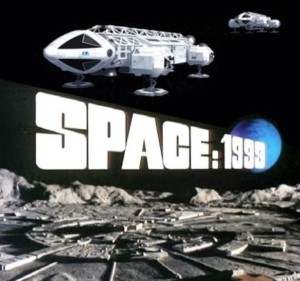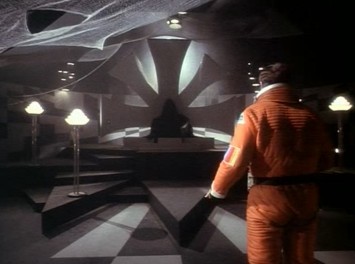 The 1970’s were a weird time for Science Fiction. Trek came out a decade earlier and shaped the way Americans looked at science fiction on television with a hopeful outlook on our future. I can’t say how it felt to the general public at the time but I think Space: 1999 comes off as a bit more serious; a combination of hard science, mixed with fantasy and melodrama. It works but only for those willing to deal with a lot of dialogue. Having said that, this particular episode resonated with me because this has been a truly strange start to a year. I watched a Netflix movie called Don’t Look Up! on the same day as I watched an Avengers episode called The White Dwarf; both around a pending collision between Earth and a near-Earth object. Luckily this episode takes place on our moon and it has been drifting through space, but it’s still the same idea: planetary object on a collision course with our heroes.
The 1970’s were a weird time for Science Fiction. Trek came out a decade earlier and shaped the way Americans looked at science fiction on television with a hopeful outlook on our future. I can’t say how it felt to the general public at the time but I think Space: 1999 comes off as a bit more serious; a combination of hard science, mixed with fantasy and melodrama. It works but only for those willing to deal with a lot of dialogue. Having said that, this particular episode resonated with me because this has been a truly strange start to a year. I watched a Netflix movie called Don’t Look Up! on the same day as I watched an Avengers episode called The White Dwarf; both around a pending collision between Earth and a near-Earth object. Luckily this episode takes place on our moon and it has been drifting through space, but it’s still the same idea: planetary object on a collision course with our heroes.
One thing that stands out to me about the third episode of Space: 1999 is that we’re still getting to know the cast. Helena says that John has lead them through “every mission” so far but I was thinking that it was an odd statement to make when they’ve only had two episodes up until now. This turns out to be a ploy on Helena’s part, which made a lot more sense of the statement, but if we watch Koenig from the start we actually do get an idea that he’s a good man. When he thinks he’s going to lose a friend and colleague, he gets tears in his eyes; he struggles to keep it together. This is a man who cares deeply about his people. I don’t think I ever recall James Kirk getting tears in his eyes over anyone but Spock! So when the threat of collision seems real, for him to be willing to put his people at risk is a big deal and even if his people don’t trust him, we (the audience) should. We’ve been given a look at what Koenig is made of. The problem is that this episode is so early in the series, the audience might not realize it yet.
 Of course, even the audience might still question him because his original plan is not a very logical one. Paul goes missing after a nuclear explosion and the Alphans don’t know if he’s alive, so John authorizes a launch into danger for both himself and another colleague. As a captain, I think the right, although harder, choice would have been to accept the possibility that you’ve lost one crewman as opposed to the almost definite loss of three. Also, when he is looking for Paul, he hears a voice providing the coordinates to find his missing friend, and sets course without any proof. One could wonder if he’s having a breakdown, as his peers start to suspect. I guess the message is one of faith and we should be thankful that I wasn’t in charge on this mission, because I was doubting his choices. Koenig’s approach is far more Doctor-ish (Doctor Who, that is) with the maxim: while there’s life, there’s hope. I wish I had thought of that before thinking he was a nitwit! John’s payoff is to meet an alien being: Arra, Queen of Atheria. (Or perhaps, ancient spider queen, based on her age and the webs she sits amongst!) She promises if John and the Alphans do nothing during a planetary collision, nothing will happen. For no readily apparent reason, John trusts her. Again, faith versus logic seems to be the message of the episode and for all the hard science we’re subjected to at the start of the episode, it’s faith that wins the day!
Of course, even the audience might still question him because his original plan is not a very logical one. Paul goes missing after a nuclear explosion and the Alphans don’t know if he’s alive, so John authorizes a launch into danger for both himself and another colleague. As a captain, I think the right, although harder, choice would have been to accept the possibility that you’ve lost one crewman as opposed to the almost definite loss of three. Also, when he is looking for Paul, he hears a voice providing the coordinates to find his missing friend, and sets course without any proof. One could wonder if he’s having a breakdown, as his peers start to suspect. I guess the message is one of faith and we should be thankful that I wasn’t in charge on this mission, because I was doubting his choices. Koenig’s approach is far more Doctor-ish (Doctor Who, that is) with the maxim: while there’s life, there’s hope. I wish I had thought of that before thinking he was a nitwit! John’s payoff is to meet an alien being: Arra, Queen of Atheria. (Or perhaps, ancient spider queen, based on her age and the webs she sits amongst!) She promises if John and the Alphans do nothing during a planetary collision, nothing will happen. For no readily apparent reason, John trusts her. Again, faith versus logic seems to be the message of the episode and for all the hard science we’re subjected to at the start of the episode, it’s faith that wins the day!
“I should very much like to know my place in the scheme of things!” Well, John, your place was to allow an ancient alien to live and the result is a few damaged laptops! In the grand scheme, you did well and allowed Arra to “shape the future of eternity”. I’d love to think we might find out what happened to Arra in a future episode, but as her planet fades to nothing, I suspect she’s gone for good. We may never see her again. As for humanity, she says we “shall continue on…” The 60’s may have been hopeful and the 70’s may not have known where to go with the direction of a story like this, but it ends on a message of hope. On a collision course with science, I’m surprisingly happy to know that hope and faith won out in the end! ML


I learned to willingly deal with a lot of sci-fi dialogue thanks to Forbidden Planet, Fantastic Voyage and of course 2001: A Space Odyssey. I think that in Space 1999’s case, it benefits how each episode’s message can be taken in by the audience, even with a message about hope and faith prevailing. Each sci-fi show can work out with its own unique method of dialogue as Star Trek, Dr. Who and The Twilight Zone have most pivotally taught us. With a distinctive actor for the role of a space age commander, like Martin Landau, William Shatner and Bruce Boxleitner, it certainly benefits how the dialogue is lead for the ensemble. Thanks, ML, for your review.
LikeLiked by 1 person
I watched the entire run of Space 1999 on the Shout Factory website last year. There it was placed as Episode 13, which makes more sense of Helena’s line about “every mission.”
Anyway, looking forward to reading your reviews of these. It was definitely an interesting, unconventional show.
LikeLiked by 1 person